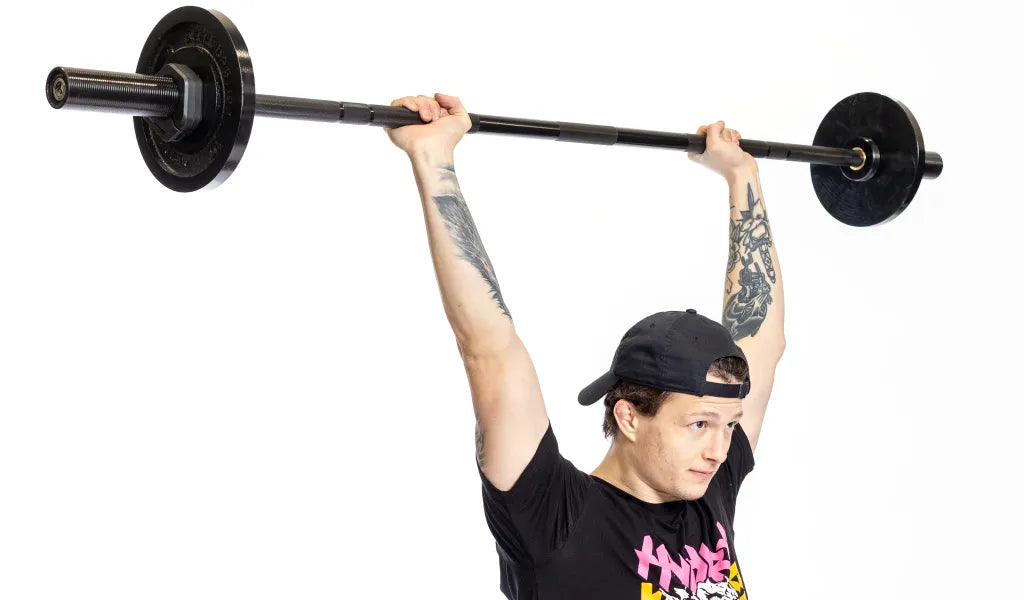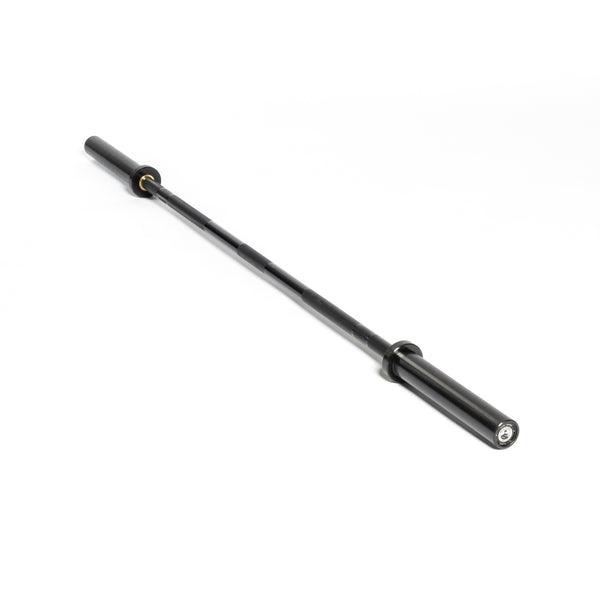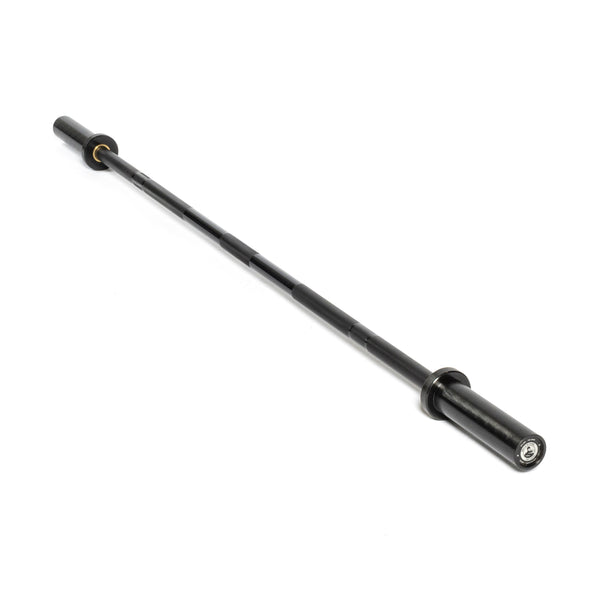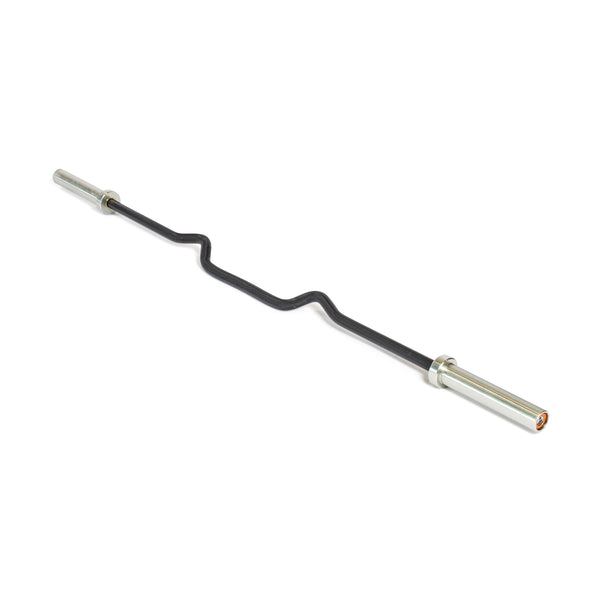When building a home gym, space is often the biggest constraint. Traditional 7-foot Olympic barbells can feel overwhelming in small basements or garages, but thankfully, shorter alternatives like the 6-foot Olympic barbell offer a space-saving solution without sacrificing too much functionality.
This article breaks down the pros and cons of 6ft barbells, how they compare to their 5ft counterparts, and how to choose the right short barbell for your training style and gym setup.
What is a 6ft Olympic Barbell?
How long is a standard Olympic barbell?
A standard Olympic barbell is 86.6 inches (roughly 7.2 feet) in total length, weighs 20kg (44 lbs), and is typically rackable, with long sleeves for full-size plate loading. These bars are used in commercial gyms, competitions, and serious lifting setups.
What makes a 6ft bar different?
A 6ft Olympic barbell is approximately 72 inches long and typically weighs 15–20kg, depending on the build. Most 6ft barbells still feature Olympic-sized sleeves, making them compatible with standard weight plates and collars.
Some 6ft bars maintain a full-length shaft to preserve rackability, while others shorten the shaft or sleeves, making them more compact, but potentially limiting in function.
Pros and Cons of a 6ft Olympic Barbell
Benefits of a 6ft barbell
-
More compact: Ideal for tight home gyms, especially those with limited wall clearance or low ceilings.
-
Easier to handle: Shorter length makes the bar less unwieldy for beginners or smaller lifters.
-
Compatible with Olympic plates: Unlike some budget bars, quality 6ft barbells maintain 50mm sleeves.
-
Potentially rackable: Some models—like the Bells of Steel Short Rackable Barbell, are designed to fit standard squat racks despite being shorter overall.
Limitations of a 6ft barbell
-
Reduced sleeve length: Most 6ft barbells have shorter sleeves, which limits how much weight can be loaded.
-
Not competition standard: If you plan to train for powerlifting or Olympic lifting meets, a shorter bar may not prepare you adequately.
-
Non-rackable versions: Some 6ft bars are too short to sit in a squat rack, making them unsuitable for bench press or squats without modifications.
Comparing 6ft and 5ft Barbells
What’s the difference between 5ft and 6ft bars?
5ft barbells are even shorter, typically around 60 inches in length, and usually weigh less, around 10–15kg. While even more compact than 6ft bars, the shorter shaft length often means they’re non-rackable and best used for accessory lifts like curls, rows, and landmine movements.
6ft barbells, on the other hand, strike a balance between compactness and functionality. Depending on the design, they may still be rackable and feel similar to a standard barbell, especially during pressing or deadlifts.
Bells of Steel Short Barbell Options
1. Bells of Steel Short Rackable Barbell
-
Total Length: 69” (5.75ft)
-
Sleeve Length: 7.9”
-
Shaft Diameter: 28.5mm
-
Weight: 13kg (29lbs)
-
Key Benefit: Full shaft length allows rack compatibility
-
Best For: Lifters who want a bar that fits in their power rack but saves horizontal space
This bar keeps the full Olympic feel with a reduced footprint. It’s ideal for small home gyms where you still want to squat, bench, and deadlift without compromise.
2. Bells of Steel Short Utility Barbell
-
Total Length: 69”
-
Sleeve Length: 12”
-
Shaft Diameter: 28mm
-
Weight: 15kg (33lbs)
-
Key Benefit: Ultra-compact and easy to store
-
Best For: Isolation work, landmine movements, deadlifts, and tightest training spaces
This version is not rackable, but perfect for lifters who need something portable and compact for accessory lifts or floor strength training.
Which Barbell Should You Choose?
When to go with a 6ft Olympic barbell
Choose a 6ft barbell if:
-
You want to squat and bench in a rack but don’t have room for a 7ft bar
-
You train with moderate to heavy weights and want full barbell functionality
-
Your space is limited, but not ultra-tight
When to choose a 5ft barbell
Go with a 5ft short bar if:
-
You don’t need rackability or plan to use the bar for accessory movements
-
You’re tight on space and need a lighter, more compact option
-
You prefer a second barbell for curls, rows, and landmine lifts
When to go between:
Choose a 5-6ft short bar if:
- You love Bells of Steel
- You can’t decide between the options
- You want a high-quality barbell to fit in your small home gym
All are valid options—it just depends on your training needs and space. You know which one we’d pick!
Final Thoughts
A 6ft Olympic barbell can be the perfect compromise between space-saving convenience and lifting capability. It’s shorter than a standard bar, but depending on the model, it may still offer rack compatibility, Olympic plate support, and a traditional feel in the hands.
For lifters with limited space but big strength goals, the Bells of Steel Short Rackable Barbell offers full performance in a smaller package. Meanwhile, the Short Utility Barbell delivers compact versatility for lighter training or tight spaces.






